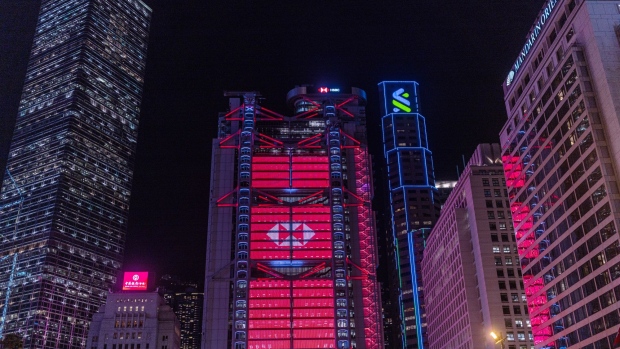Sep 22, 2022
HSBC Raises Hong Kong Prime Rate for First Time Since 2018
, Bloomberg News

(Bloomberg) -- HSBC Holdings Plc and Standard Chartered Plc raised their main lending rate in Hong Kong for the first time in four years, bumping up borrowing costs for property owners and businesses at a time when the economy is struggling with Covid restrictions and an exodus of talent.
Hong Kong’s biggest lender HSBC is boosting its prime rate by 12.5 basis points to 5.125% and warned of more increases to come. Rival Standard Chartered is lifting its rate by the same amount to 5.375%.
The moves came hours after the Hong Kong Monetary Authority on Thursday raised its base rate by 75 basis points, keeping in step with the US Federal Reserve. The Asian financial hub’s monetary policy moves in tandem with the US to preserve the local dollar’s peg with the US currency.
Having enjoyed low, stable borrowing costs for more than a decade, Hong Kong’s economy is now bracing for higher rates as the US central bank has aggressively tightened to fight the worst inflation in 40 years. At the same time, Hong Kong is in the midst of an economic slump, weighed down by some of the world’s most restrictive Covid policies and an exodus of residents amid political tensions.
“Anticipation around a potential prime rate increase in Hong Kong has been ripe and today’s announcement marks the beginning of an upward cycle,” Luanne Lim, HSBC’s Hong Kong chief executive, said in a statement. “We have considered multiple factors, including the macro-economic environment, HIBOR trends as well as the impact on our economy and the community.”
Other lenders are expected to follow in raising prime rates, adding to pressure on the world’s least affordable property market where Goldman Sachs Group Inc. has estimated prices may slump by about 20% over the next four years.
The banks are themselves also battling rising borrowing costs, with interbank rates hitting the highest level in 14 years. That’s bad news for homeowners, who almost all have flexible mortgage loans linked to the Hong Kong interbank offered rate. The loans have an upside protection based on a ceiling below the prime rate. Last month, HSBC and Standard Chartered Plc raised that cap by 25 basis points for new homebuyers, driving rates to the highest since 2008, according to Bloomberg Intelligence.
All 12 economists surveyed by Bloomberg had predicted that the prime rates will climb this year, some by as much as 100 basis points.
HSBC also on Thursday announced it was raising its US dollar savings rate by 25 basis points to 0.5%.
The HKMA has increased its benchmark rate five times this year, in line with the Federal Reserve. The city’s de-facto central bank has also ramped up currency purchases this year to maintain the peg as ample liquidity made it attractive for traders to short the local dollar against the higher-yielding greenback.
Financial Secretary Paul Chan, however, downplayed the concerns on Thursday, telling reporters that the city’s housing market is not at risk of a sharp adjustment. At a separate press conference, HKMA Chief Executive Eddie Yue assured investors that the city’s financial and currency markets continue to operate in an orderly manner, and the linked exchange rate system continues to work well.
The benchmark Hang Seng Index fell as much as 2.6% on Thursday to its lowest level since December 2011 amid a broader selloff in global markets following the Fed’s hawkish stance.
Raising the prime rate “is a significant move that affects Hong Kong property buyers across the board -- including new buyers and existing ones,” said Patrick Wong, an analyst at Bloomberg Intelligence. “It’s likely to hurt investor sentiment toward Hong Kong property, which is already struggling and reduce affordability further.”
The government has cut its growth forecast twice this year, predicting a possible contraction in gross domestic product. Hong Kong housing could become the most unaffordable since 1998 if banks including HSBC raise mortgage rates to 3.5%, Bloomberg Intelligence estimates. The percentage of monthly household income used for mortgage repayments in Hong Kong could reach 60.1%, Bloomberg analysts Wong and Francis Chan wrote in a note on Thursday.
(Adds details on Standard Chartered’s hike in first and second paragraph)
©2022 Bloomberg L.P.






